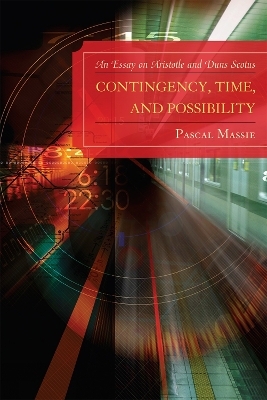
Contingency, Time, and Possibility
Lexington Books (Verlag)
978-0-7391-4929-4 (ISBN)
If we are to distinguish mere non-being from that which is not, yet may be, from that which was not, yet could have been, or from that which will not be, yet could become, we are committed in some way to grant being to possibilities. The possible is not actual; yet it is not nothing. What then could it be? What ontological status could it possess? In Contingency, Time, and Possibility: An Essay on Aristotle and Duns Scotus, Pascal Massie opens these questions by combining two approaches: First, an original inquiry that analyses the notions of chance, fate, event, contradiction, and so forth, and suggests that the distinction between potency and act arises from a confrontation with the impossible. Second, a historical inquiry that focuses on Aristotle and Duns Scotus, two key figures contributing to a fundamental transformation in the history of Western ontology; namely, the transition from a metaphysics of nature (Aristotle) to a metaphysics of the will (Scotus). In doing so, this book departs from the prevailing interpretation of the history of modal logic according to which Scotus rejected the principle of plenitude attributed to Aristotle and replaced the ancient diachronic theory of possibilities with a synchronic one, thereby contributing to a “possible world’s semantics.” Rather, Massie argues that in its proper ontological import, the question of possibility concerns the limit between being and non-being and that this limit must be thought in terms of temporality. With Scotus, however, a radical shift occurs. Possibilities are understood in terms of will, creation, omnipotence, and transcending freedom. As such, they belong to the realm of what is supremely actual (i.e., superabundant activity). What used to be understood as a lesser degree of being (the quasi non-being of uninformed matter and mere possibilities) becomes the mark of omnipotence.
Pascal Massie is associate professor of philosophy at Miami University in Oxford, Ohio.
Part 1 Introduction Part 2 Part One. Contingent Encounters Chapter 3 Chapter One. Contingency, Chance, Fortune Chapter 4 Chapter Two. The Surprise and The Why Part 5 Part Two. Modal Hierarchy and its Ontological Foundation Chapter 6 Chapter Three. Contingency, Logic and Logos Chapter 7 Chapter Four. Megarian Possibilities Chapter 8 Chapter Five. The Master Argument Chapter 9 Chapter Six. Aristotle's Resolution Part 10 Part Three. Possibilities, Time, Ontology Chapter 11 Chapter Seven. The Being of Possibilities Chapter 12 Chapter Eight. The Priority of Actuality Chapter 13 Chapter Nine. 'In-Either-Of-Two-Ways' Matter and Limbo Chapter 14 Chapter Ten. The Future of Possibilities Chapter 15 Chapter Eleven. Potentiality and Non-Being Chapter 16 Chapter Twelve. Toward Divine Power Part 17 Part Four. Duns Scotus and the Possibilities of the Will Chapter 18 Chapter Thirteen. 'Ex Nihilo' and 'Post Non Esse' (Scotus'Questions On Metaphysics) Chapter 19 Chapter Fourteen. The Will and Its Objects Chapter 20 Chapter Fifteen. Entitative and Active Contingency Chapter 21 Chapter Sixteen. Preliminary Remarks on a Contemporary Interpretation Chapter 22 Chapter Seventeen. Another Sea-Battle Chapter 23 Chapter Eighteen. Future and Eternity Chapter 24 Chapter Nineteen. The Free Play of The Wills Chapter 25 Chapter Twenty. Saving Contingency: Ockham's Objection Part 26 Conclusion. Thinking the Impossible
| Verlagsort | Lanham, MD |
|---|---|
| Sprache | englisch |
| Maße | 163 x 240 mm |
| Gewicht | 630 g |
| Themenwelt | Geisteswissenschaften ► Philosophie ► Erkenntnistheorie / Wissenschaftstheorie |
| Geisteswissenschaften ► Philosophie ► Philosophie Altertum / Antike | |
| Geisteswissenschaften ► Philosophie ► Philosophie des Mittelalters | |
| ISBN-10 | 0-7391-4929-6 / 0739149296 |
| ISBN-13 | 978-0-7391-4929-4 / 9780739149294 |
| Zustand | Neuware |
| Haben Sie eine Frage zum Produkt? |
aus dem Bereich

![Was heißt Denken?. Vorlesung Wintersemester 1951/52. [Was bedeutet das alles?] - Martin Heidegger](/media/113619842)
